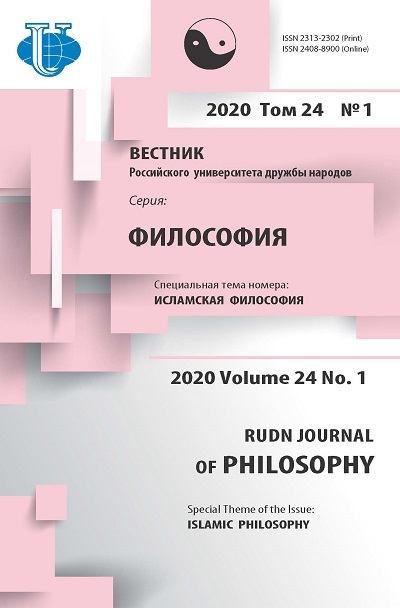The Islamization of Aristotelism in the Metaphysics of Ibn Sina
- Authors: Efremova N.V.1
-
Affiliations:
- Institute of Philosophy RAS
- Issue: Vol 24, No 1 (2020): ISLAMIC PHILOSOPHY
- Pages: 39-54
- Section: ISLAMIC PHILOSOPHY
- URL: https://journals.rudn.ru/philosophy/article/view/23090
- DOI: https://doi.org/10.22363/2313-2302-2020-24-1-39-54
- ID: 23090
Cite item
Full Text
Abstract
The article analyzes the activity of the greatest classic of the Islamic philosophy - Ibn Sina (Avicenna, 980-1037), aimed at the revision of Aristotelianism, mainly in terms of its synthesis with Islamic monotheism. Preferential attention is paid to the metaphysical section of Avicennian multivolume encyclopedia “The Healing” (c. 1020-1027). Instead of Aristotelian God / the Prime Mover as the final cause, which serves as the source of the movement of the world, Avicenna establishes God / Necessary Being, who acts as the Giver of being. Developing the ontological foundation of creationism, i.e. the creation of every thing in the world, the philosopher introduces a distinction between essence and existence ( māhiyyawujūd , lat. essentia-existentia), which will pass through the subsequent history of philosophy. Ibn Sina thoroughly modifies the Aristotelian doctrine of the unity of God and His essential cataphatic attributes. The intellectual narcissism of God, Who only knows Himself in Stagirite, he changes with the concept of Divine Omniscience and His providence of all existents. Ibn Sina transforms Aristotelian eternalism into eternalistic creationism, modifying the emanationist scheme of cosmogenesis advanced by al-Farabi (d. 950), in which the process of proceeding of the existents from the First Principle appears as an intellectual act. The Muslim philosopher complements Aristotelian cosmology with the doctrine of angels, whom he identifies with cosmic intellects and souls as the governors of the celestial spheres. Avicennian radical innovation is in the doctrine of Active Intellect ( al-‘akl al-fa‘‘al , lat. intellectus agens ), who is not only the ruler of the sublunar world, but actually is its demiurge. This intellect is assigned with the function of the illumination of the human intellect, as well as with the role of the archangel Gabriel the transmitter of divine revelation according to Muslim tradition. From the philosophical perspective, Avicenna develops alien to Aristotelianism topics related to the prophecy and revelation, the immortality of the soul and its otherworldly fate.
About the authors
Natalia V. Efremova
Institute of Philosophy RAS
Author for correspondence.
Email: salamnat@mail.ru
Ph.D. in Philosophy, Senior Research Fellow at the Department of Oriental Philosophies, Institute of Philosophy
Goncharnaya Str., 12, build. 1, Moscow, Russian Federation, 109240References
- Sagadeev AV. Ibn Sina as a systematizer of a medieval scientific knowledge. Studies on Arab and Muslim Culture and Philosophy: Selected Articles written by A.V. Sagadeev. Moscow: RUDN University, 2009. P. 154—174. (In Russ.).
- Gutas D. Avicenna and the Aristotelian Tradition. Leiden—Boston: Brill, 2014. xxxi, 615 p.
- Bertolacci A. The Reception of Aristotle’s Metaphysics in Avicenna’s Kitāb al-Šifā’. Leiden—Boston: Brill. 2006. 675 p.
- Aristotle. Metaphysics. In: Aristotle. Collected works in four volumes. Moscow: Mysl, 1976. Vol. 1. P. 63—367. (In Russ.).
- Ibn-Sina. Ash-Shifа̄ ’: al-Ilāhiyāt. Vols. 1—2 (continuous numbering). Cairo: Wizārat aththaqāfa wa-l-irshād al-qawmī; 1960. 478 p. (In Arabic).
- Aristotle. Second Analytics. In: Aristotle. Collected works in four volumes. Moscow: Mysl, 1978. Vol. 2. P. 255—346. (In Russ.).
- Thomas Aquinas. Summa theologiae. Кiev: Nika-Tsentr, Elga; Мoscow: Elkor-МК; 2002; 1. 560 p. (In Russ.).
- Ibrahim TK, Efremova NV. Muslim religious philosophy: falsafa. Kazan: Kazan University, 2014. 236 p. (In Russ.).
- Ibn-Sina (Avicenna). “Al-Ishārāt wa-t-tanbīhāt” [on metaphysics]. Transl. from Arabic and comm. T Ibrahim, NV Efremova. Part one. Orientalistica. 2018;1(2):251—274. doi: 10.31696/2618-7043-2018-1-2-251-274. (In Russ.).
- Aristotle. Physics. In: Aristotle. Collected works in four volumes. Moscow: Mysl, 1981. Vol. 3. P. 59—262. (In Russ.)
- Aristotle. Ethica Major. In: Aristotle. Collected works in 4 volumes. Moscow: Mysl, 1984. Vol. 4. P. 295—374. (In Russ.).
- Ibrahim TK, Efremova NV. On the concept of love as a fundamental attribute of God in Avicenna’s theology. Minbar. Islamic Studies. 2018;11(2):283—295. doi: 10.31162/2618-9569-2018-11-2-283-295. (In Russ.).
- Ibn-Sina (Avicenna). Al-Isharat wa-t-tanbihat [on metaphysics]. Translated from Arabic into Russian, comments and introduction by T Ibrahim and NV Efremova. Part three. Orientalistica. 2019;2(1):79—116. (In Russ.).
- Ibrahim TK. Avicenna’s Optimistic Theodicy. Uchenye Zapiski Kazanskogo Universiteta. Seriya Gumanitarnye Nauki Proceedings of Kazan University. Humanities Series. 2017. Vol. 159. № 6. P. 1443—1454. (In Russ.)
- Ibn-Sīnā. Ash-Shifā’: At-Tabi’yyāt: 6) An-Nafs. Cairo: al-Hay’a al-misriyya al-‘āmma lil-Kitāb, 1975. XVIII, 261, 30 p. (In Arabic).
- Aristotle. On the Soul. In: Aristotle. Collected works in four volumes. Moscow: Mysl, 1976. Vol. 1. P. 369—448. (In Russ.).
Supplementary files















